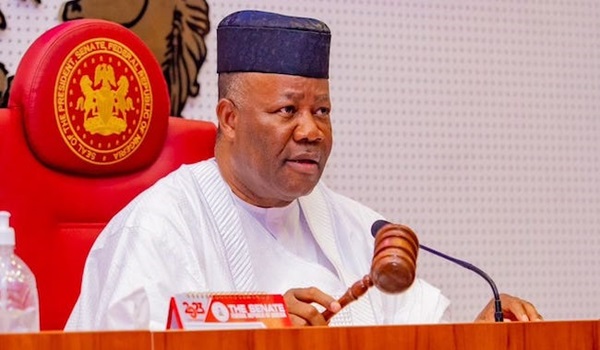Owing to the hardship being faced in the country, senators have asked the Federal Government to end the pain of Nigerians by applying urgent, workable solutions in its economic recovery policies.
With the inflation rate at 28.92 per cent, increased hunger, an exchange rate of about N1,500 to the 1USD, insecurity, and scarcity of food, lawmakers say President Bola Tinubu and his economic team must respond with measures yielding faster results than they do presently.
This came as senators grilled members of the Economic Management Team at the National Assembly in Abuja on Friday.
The team, which was led by the Minister of Finance and Coordinating Minister of the Economy, Mr Wale Edun, appeared before the Joint Senate Committee on Finance and Banking/Insurance co-chaired by senators Sani Musa and Adetokumbo Ashiru.
The Governor of the Central Bank of Nigeria (CBN), Mr Yemi Cadoso, and the Minister of Budget and Economic Planning, Sen. Abubakar Bagudu, were also in attendance.
Senators grilled the ministers for over three hours, seeking explanations for the current economic hardship, particularly inflation, exchange rate crisis, insecurity, and food scarcity that had forced Nigerians to start protesting publicly in some states of the Federation.
They noted that the sufferings faced by Nigerians continued to worsen by the day, in spite of constant assurances by government that its interventions were yielding fruits.
For instance, Sen. Orji Kalu told the team that the manufacturing and agriculture sectors “are practically dead.”
Kalu said the “rush for dollar” in Nigeria had reached an embarrassing level where some goods and services were now priced in the US currency in Nigeria.
“Using of dollar in Nigeria should be an abomination. I can see even shops in Abuja advertising their goods in dollars. Are we going to dollarise our economy?
“And what are your plans to stop the threat by Nigerian Labour Congress (NLC) to embark on a protest?” he said.
Sen. Abdul Ningi observed that Nigerians had heard more speeches and promises from government officials than solutions to their sufferings.
He said, “The rhetoric continues. This is typical of us. The dollar has been criminalised. Most of us in government are involved. And it even starts from the CBN.
“People are stealing this dollar and know nothing will happen to them. This issue of dollar bribe is from top to bottom.”
But, the finance minister, Edun, while reassuring the senators that the government’s interventions were yielding results, expressed sympathy for Tinubu to Nigerians and urged for more patience to allow his administration’s measures to mature.
On his part, the CBN governor, Cardoso, reiterated the government’s belief that the inflationary rate would drop to around 21.4% later in the year.
For the exchange rate crisis, Cardoso said one way the elite could help the government in resolving it was to reduce their appetite for using foreign currencies, especially the dollar.
He disclosed that foreign investors had begun to restore confidence in the Nigerian economy as a result of the measures introduced, which had seen an inflow of over $ 1 billion lately.
Cardoso spoke further, “The Nigerian foreign exchange market is currently facing increased demand pressures, causing a continuous decline in the value of the naira. Factors contributing to this situation include speculative forex demand, inadequate forex supply increased capital outflows, and excess liquidity.
“To address exchange rate volatility, a comprehensive strategy has been initiated to enhance liquidity in the FX markets. This includes unifying FX market segments, clearing outstanding FX obligations, introducing new operational mechanisms for BDCs and IMTOs, enforcing the Net Open Position limit, Open Market Operations, and adjusting the remunerable Standing Deposit Facility cap among others.
“Distinguished Senators, these measures, aimed at ensuring a more market-oriented mechanism for exchange rate determination, will boost foreign exchange inflows, stabilize the exchange rate, and minimise its pass-through to domestic inflation.
“Indeed, they have already started yielding early results with significant interest from Foreign Portfolio Investors (FPIs) that have already begun to supply the much-needed foreign exchange to the economy.
“For example, upwards of $ 1 billion in the last few days came in to subscribe to the Nigeria Treasury Bill auction of 1 trillion Naira which saw an oversubscription earlier this week.
“Our measures aimed at improving USD supply into the Nigerian economy have significant potential in taming the volatility of the exchange rates. However, for these measures to be sustainable, we must as a country, moderate our demand for FX.
“It is also clear that the task of stabilizing the exchange rate, while an official mandate of the CBN, would necessitate efforts beyond the Bank itself. It will also include actions by corporates and individuals to reduce our frequent demand for the dollar for business and personal needs.”
When asked to tell Nigerians exchange rate would stabilise or drop significantly, the governor replied that he did not know.
“Our measures on exchange rate. Well, we don’t know when it (rate) will go down, but can I assure you that as the measures kick in, rates will go down ultimately.
“We have to moderate our demand for FX as well”, Cardoso added.
